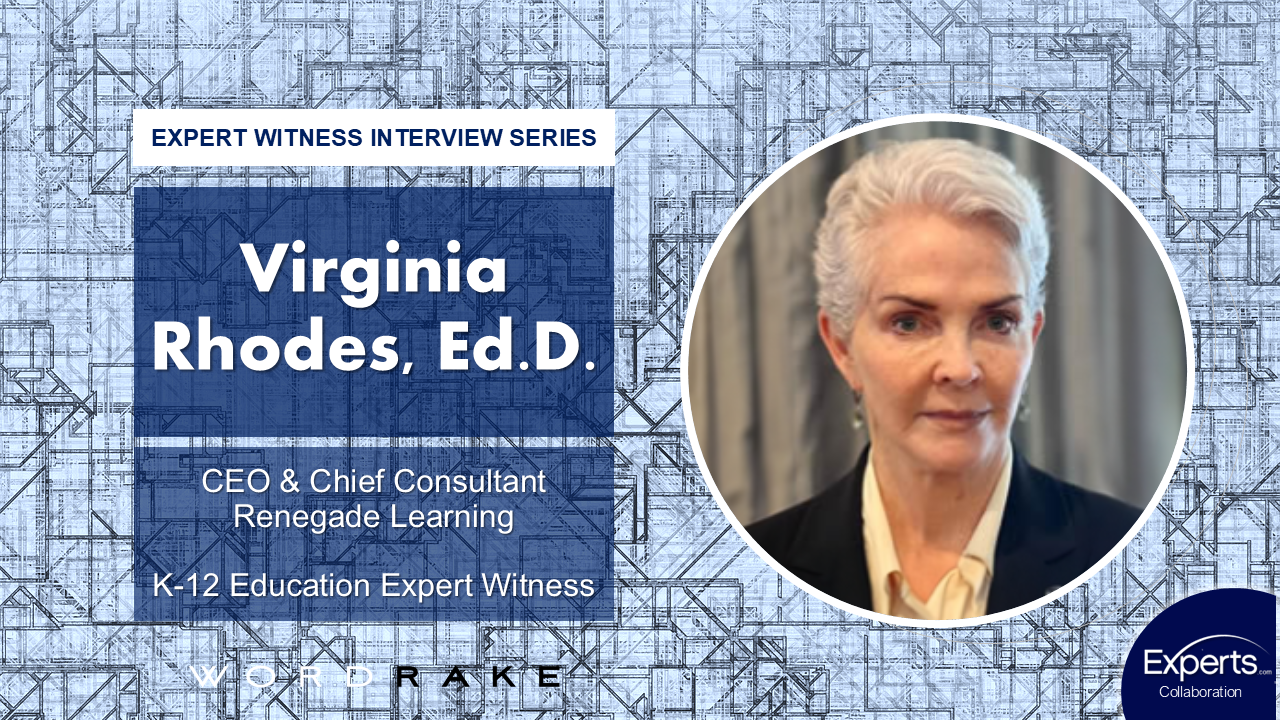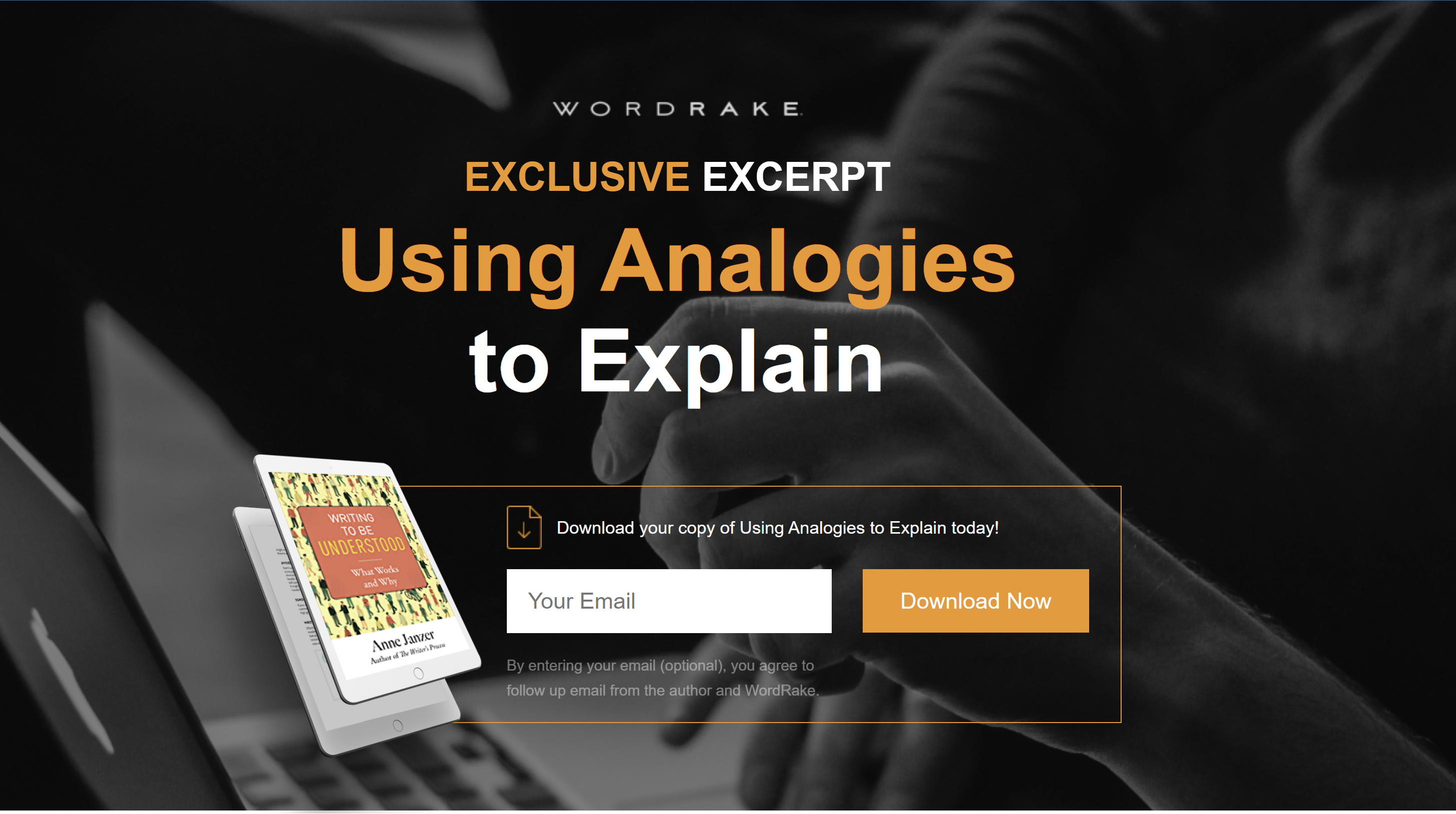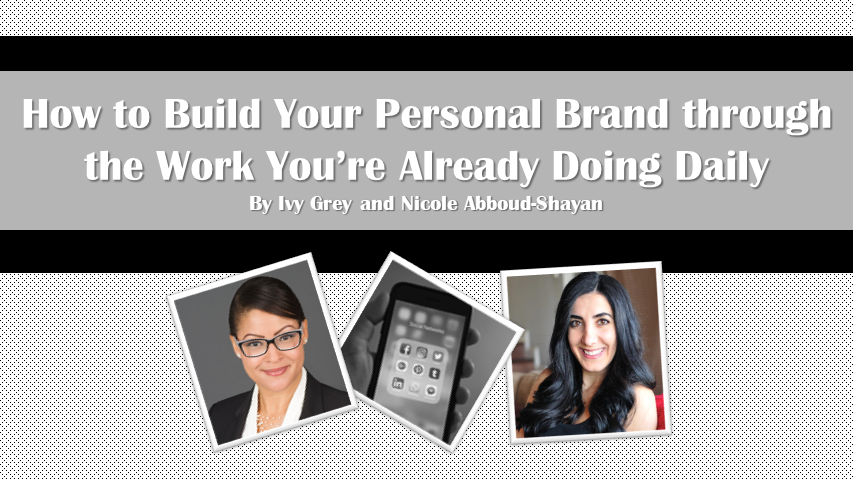Virginia L. Rhodes, Ed.D., Chief Consultant of Renegade Learning and education expert witness, helps districts create new models tailored to student-centered learning. Working with schools, businesses, and agencies helps her bring quality and equity to public schools. Here's Dr. Rhodes' educator and expert witness story.
What is your professional background, and how did you become an expert witness?
I was a high school principal when I got a phone call out of the blue from an attorney who was head of the Legal Aid office in Chicago. She said someone she met on her last flight home suggested me for a case they discussed—they were suing the Chicago school district for under-serving homeless children. They needed a school administrator to interpret their discovery documents. I took the case and filed it away mentally with the thought, "Hmm, I could do this kind of work when I retire." And 4 years later, I did!
What kinds of cases do you typically work on, and what types of attorneys or law firms seek your expertise?
I work on cases in which something has gone wrong in a K-12 school. These incidents have included accidents (one kid lost a finger on a faulty band saw in shop class), wrongful termination, sexual abuse by school staff, student or staff injury, policy issues, and discrimination.
What kinds of documents do expert witnesses write?
Starting from least frequent to most frequent: affidavits, declarations, and reports. My reports have been as short as 5 pages, or in one case, closer to 60 pages. The type and length of the document depends on the attorney's specific strategies.
How do you prepare to write an expert witness report?
Here’s my process:
Getting Started
- Clarify direction from the retaining attorney. This is called “establishing the scope” of my work. Which issues does s/he want me to examine? Are there issues that s/he does not want me to form an opinion nor testify about?
- Read all materials sent by the attorney; take notes.
- Determine any issues that require independent research; search for additional background information or existing related research.
- Take a day or two to let it all sink in before I start writing.
Planning to Write
- List the key issues for discussion that connect to the questions the retaining attorney needs answered.
- Address the issues and explain my conclusions. This is called “forming an opinion.” Remember that "opinion" does not mean "my first thoughts." The opinion is my conclusion regarding on each element after thinking through all the elements of the case, how they weave together, and whether they did or didn't contribute to the problem.
- Construct a “basis” for each opinion, which is a logical step-by-step explanation for your conclusion.
Writing the Report
- Set up the report format and the sections for the Table of Contents.
- Finally, begin drafting each section; keep my documents nearby to verify. Writing the first draft can take days, if I give myself time to think (and re-think) while I write.
- When I think I'm done, I walk away for a day then come back to re-read the whole thing. I always find that something needs more clarity and less wordiness. I may even get a new idea or insight that I hadn't thought of while drafting.
Why is it important to be a strong writer when you are an expert witness?
Because it's your writing that must convince the judge and jury of the value of your opinion. If it's not lean, logical and clear, it will confuse the judge and attorneys. Extra words will distract the readers, and misuse or misspellings will annoy them.
What's the most important element of an effective expert report?
Without question: a strong, clear, and logical basis for each opinion.
Are expert witness reports different for civil versus criminal cases?
I've worked with both kinds, but only two were criminal. In one, the attorney preferred to use an affidavit, and in the other, a full report. They are not that different, though in criminal cases, we encounter different legal terms and must make sure we are not assuming their meaning. We need to get full clarity on terms that may play out differently in civil than in criminal cases.
What surprising mistakes in an expert report can hurt your credibility?
Just getting a fact wrong. That's a bad look because it suggests sloppy reading or poor analysis, which can cause the judge or jury to doubt the value of my opinions.
What strategies or tools help you make your reports more persuasive and defensible in court?
I use Grammarly, which catches errors of all kinds, including just an unclear argument; they will suggest to drop a misspelling, or a rearrangement of the words in that sentence, or tell me that it's redundant. I have not hired technical editors or proofreaders, as it can compromise the confidentiality expected by my attorney and his/her clients. Breaching confidentiality can get you sued personally! You could find someone that you felt was ethical...but to me, it's not worth the risk.
What do you think about using AI in expert witness writing? Are there ethical methods for implementing it in your practice?
I use it for other purposes in my life, but I don't use it in my expert witness work yet. This is because I think we're in an early period of acceptance of it by laypeople. Jurors may question or disregard your opinions if the opposing attorney asks you on the stand if you used AI to produce your report. You may be using it appropriately, but many ordinary and even educated people still do not understand or trust it.
Because AI is prevalent, how valuable is it to execute good expert witness writing? Has AI changed the quality of expert witness writing?
Excellent writing skills are imperative. When I receive an opposing expert's report to review, I have no way of knowing whether any error or weakness in their report is due to AI or just their own poor skills. Remember, we expert witnesses are old! Most of us got through 30 years or more in our fields to be considered experts rather than just retirees. Change will happen as younger emerging professionals advance into enough years in their profession to gain expert status. AI will lose its skepticism, and we will all become more savvy in spotting questionable AI-related misrepresentations or inferences. At the same time, AI will continue learning to avoid making those errors.
How do you avoid overwhelming non-expert readers with technical language?
As you write or testify, I think about your least educated friend or family member and picture them as a juror. I'm always cognitive of the fact that the average juror reads at an 8th grade level. I explain things as though they were in junior high, but with respect. This is done by using ordinary, everyday examples or analogies.
What role does reputation play in getting hired repeatedly as an expert witness?
I'm sure it's a factor. If an expert works only in a limited area, they could be affected by local lawyer talk at local Bar meetings and social events. So far, my work has been across 15 U.S. states, so I do tend to get new attorney calls from someone whose colleague has mentioned my work in their locale. The other source of reputation comes from attorney conversation after looking up and ordering one or some of my testimony transcripts in other cases that may be similar to a case of theirs. I think my written content has strengthened my expert witness reputation. Some attorneys have shared that they called me because they saw a transcript of my work or heard something positive about my writing from another attorney with whom I worked.
How does online visibility—like directories or profiles—help attorneys find you and evaluate your practice?
It is critical! I have a steady clientele. If I had to do my own personal marketing, I wouldn't be very good at it (it's not my skillset), and it would be unpaid, unbillable hours of work. Also, I need Experts.com's clients to find me.
Besides being an Experts.com member, do you self-promote your work and services (social media, newsletter subscriptions, etc.)?
Not much. I do minimal social media, but I do have both a LinkedIn profile and a website. This is because, like many expert witnesses that are otherwise retired from our original professions, I'm cherishing the flexibility of time that this kind of work gives me; I have more time for family, travel, etc. I'm only seeking a certain amount of work so that I can enjoy life as well.
What makes an expert witness credible to a judge or jury?
Good writing, being a thoughtful speaker, a serious but engaging disposition, and a sense of bias only for the truth, not for the win. It's the attorney and their client's goal to win. My job is to sort out the elements so the jury can determine the truth and the judge can apply the law to that truth.
Have you ever had to revise a report after feedback that it wasn't clear or persuasive enough? What did you learn?
Oh, yes. It teaches one to really look closely at how any reader (attorney, juror or judge) might interpret any given sentence.
Have lawyers told you that your writing samples played a role in selecting you as their expert witness?
No, because no lawyer has ever asked me for any writing samples. But some have given me repeat business because they liked my writing.
What do you wish lawyers knew about working with expert witnesses?
They need to understand the power of retaining us as early as possible while we still can advise on very specific opportunities in our own specific areas of expertise.
For example, attorneys I've worked with have had to depose school administrators and sometimes teachers, but they didn't realize that the classroom aides (lowest-paid workers in any school system) are a gold mine of information about what happens behind the scenes, including having witnessed wrongdoing. They don't have status, but they have valuable information. They tend to keep their heads down to avoid losing their jobs, but they are usually loved by the kids, who bring their problems to them. And they can be fierce advocates by disclosing information if someone has hurt a child.
What information do you wish lawyers would give you when initially contacting you about a potential engagement?
We really need to know on the front end of the engagement all the basic dates that have already been set by the court, including end of discovery date, expert disclosure date, potential month of deposition, and likely deadline for any report expected. We do know that ALL of these can get rearranged at any time; however, it helps us keep our multiple cases far enough apart so that the deadlines don't all fall around the same time.
As an expert witness, do you think there is a disconnect between expert witness communities and attorneys and law firms?
I have not seen evidence of expert witness "communities," but would be thrilled to find them if they exist! The legal industry can bridge this disconnect, and it's simple. All the legal conferences and conventions should have an affordable expert witness track, and at least one expert witness speaker in their main line-up. I see this sometimes for paralegals, but not for experts.
Have you built relationships with the attorneys and law firms you have worked with?
Yes in my own city, cordial with those in other locations also; I make it a point to go to judicial and Bar receptions to develop a reputation and keep those relationships.
What do you think most experts underestimate about being "discoverable" to attorneys?
Not sure. Most experts probably know about the directories and sign up for one or more. If not, and they are doing their own marketing, whew! What a mistake unless you are already highly skilled in that. I'm not sure how Experts.com has addressed these concerns, but I think this survey is a sure bet towards improvement. The results will educate us all.
Tell us about a published piece of work that you're most proud of and why.
KIDS ON THE MOVE: The Effects of Student Mobility On NCLB School Accountability Ratings, published by PennGSE, 2005. This was a quantitative research inquiry which required a multivariate predictive discriminate analysis. To keep it useful to practitioners and policymakers, it also contained a section with qualitative interviews of multiple students, some who had changed schools 8-12 times in the same city over their schooling years prior to graduation.
What are the top 3 skills an expert witness must have for success?
Speaking articulately, writing clearly, and research-level analytical skills. For professionals who are new to expert witnessing, register as an LLC with your state business division. Get onto 2 or 3 less expensive directories so you can get a few initial cases. As you get bigger cases, expand to one of the larger (and more expensive) directories, but keep your small ones. Then you can cover a variety of case levels. Consider going to expert witness trainings or getting some of the expert witness books produced by directories. Get a professional headshot. Turn your old resume into a more polished CV using a template instead doing it yourself. Create a fee agreement after looking up suggested content and formats. Write an introductory letter to attorneys that outlines your areas of expertise. And set up a business page on LinkedIn.
What's the most valuable lesson you learned as an expert witness?
Set up or buy a system to log your time and produce bills, and do your entries at the time that you perform the task.
What changes would you like to see in the expert witness industry?
More trainings by a wider variety of Directory companies! Introductory courses could cover initial setup, as well as strategies for writing reports and testifying. I'd personally be interested in helping develop an initial conference to test it out.
About the Author
Virginia Rhodes, Ed.D., Founder and Chief Consultant of Renegade Learning, has an extensive background in public schooling with over 35 years of experience in duty and standard of care: teacher, principal, hiring, supervision, evaluation and instruction in K-12 settings. Her research and role as an elected school board member in a large city district informs her expertise in school policy and district administrative and teaching functions. Dr. Rhodes provides expert witness research, reports & testimony for districts and law firms, working with both plaintiff and defense cases.
Visit Dr. Rhodes' Experts.com profile and connect with her on LinkedIn.









